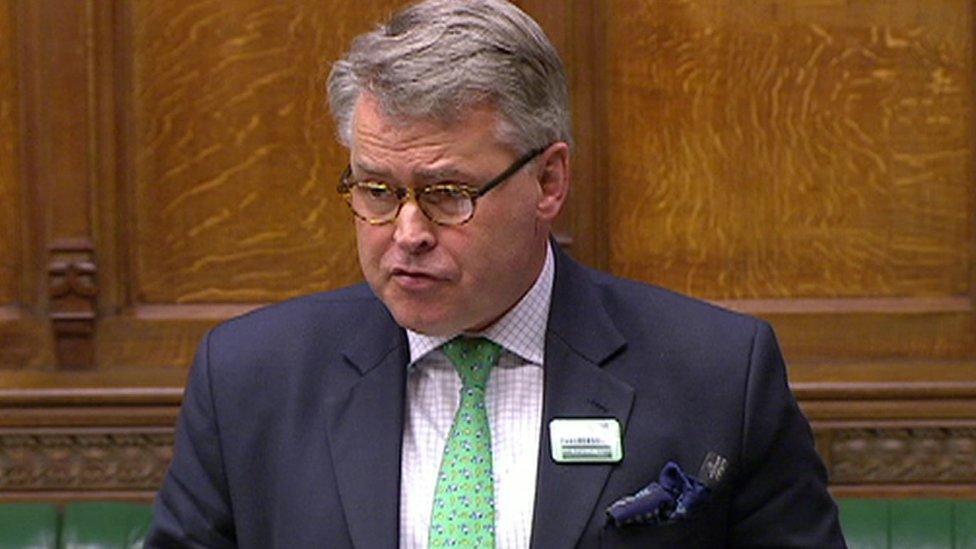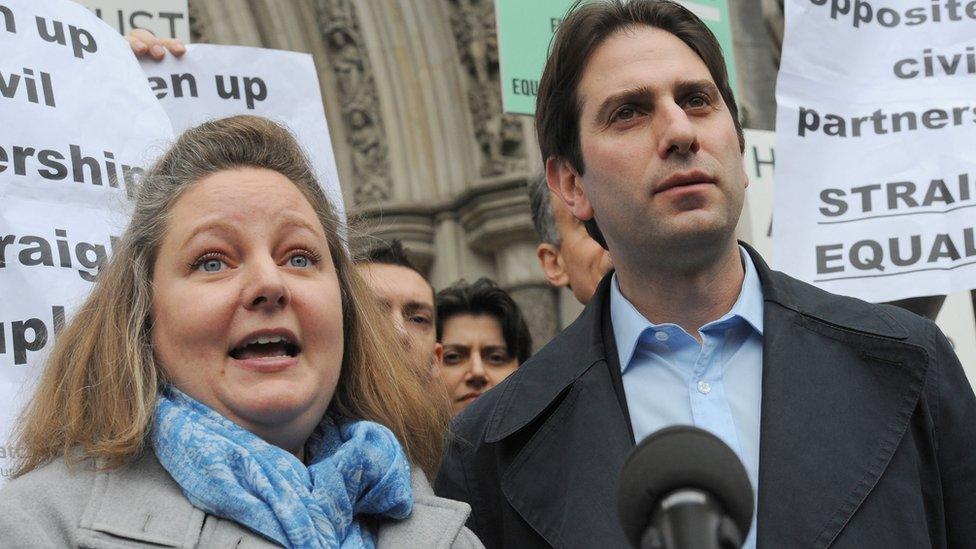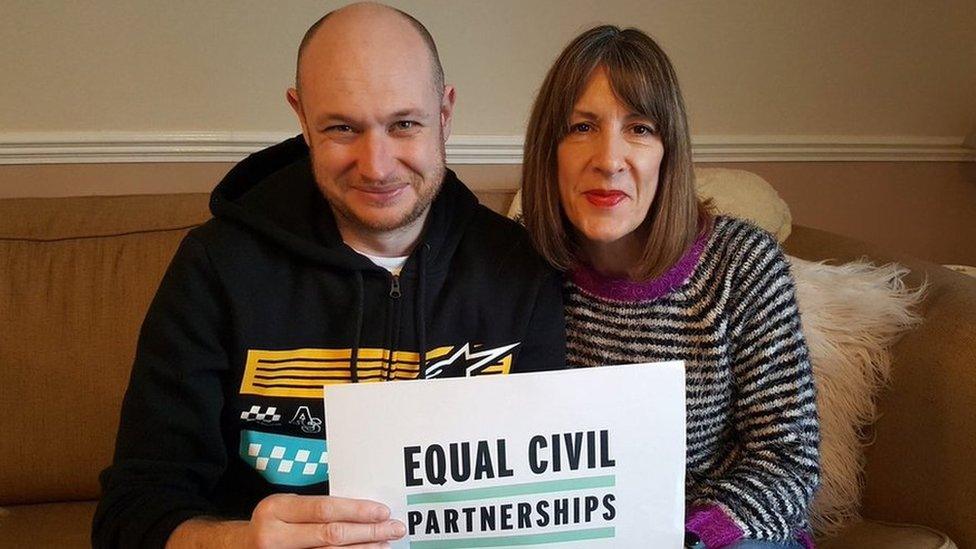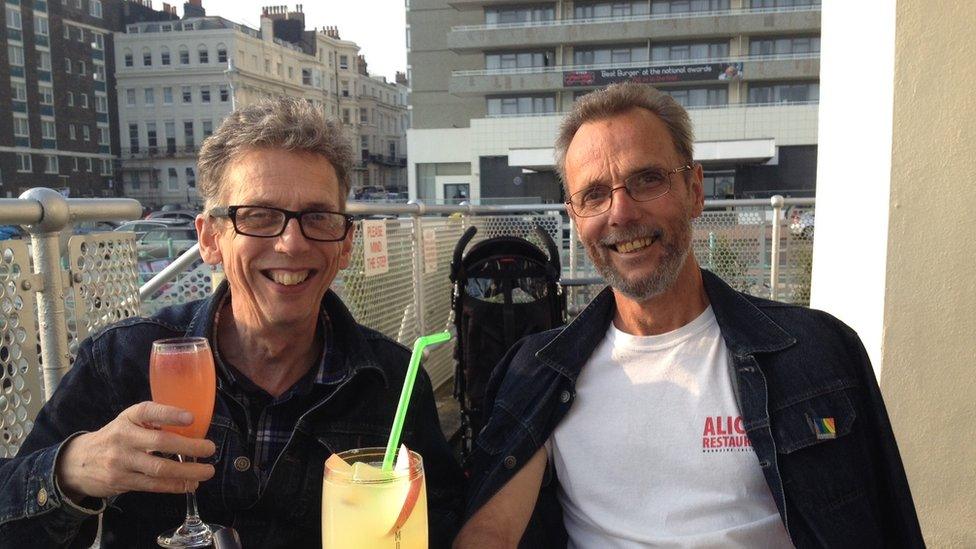MP bids to end 'unfair' civil partnership inequality
- Published

Tim Loughton MP says civil partnerships for all is a matter of fairness
A Tory MP has launched a bid to allow heterosexual couples in England and Wales to form civil partnerships in the same way as gay couples.
Tim Loughton said it was "not fair" that opposite sex couples have "the single option of marriage".
He also called for mothers' names to be included on marriage certificates and for all still births to be formally registered.
The government is backing Mr Loughton's Private Members Bill.
Home Secretary Amber Rudd said it was time both parents' names were included on marriage certificates.
"The current legislation which only allows for fathers' names is completely outdated and does not reflect modern Britain," she said.
The Home Office says it has been considering options for updating the marriage entry and working with stakeholders, including the Church of England and Church in Wales, to develop plans for this possible reform.
But Mr Loughton has been forced to water down his proposals on civil partnerships - to promise a review of the current laws rather than a straightforward commitment to allow straight couples to form civil partnerships.
This could result in equality being achieved by scrapping civil partnerships for everyone.
But Mr Loughton is confident ministers will be persuaded to back his position after they have carried out their review.
He said his Civil Partnerships, Marriages and Deaths (Registration Etc.) Bill, which received an unopposed second reading, would "correct an unintended, but glaring inequality".
Civil partnerships in England and Wales were introduced in 2004 as an initial step on the road to legalising gay marriage.
Demand then fell after gay marriage was legalised in England and Wales in March 2014, and in Scotland in December 2014.
But some straight couples who do not want a traditional marriage have argued there is now inequality in the law as they do not have the choice of a civil partnership.

What is entailed in a civil partnership?
Legal and financial protection for both parties in the event of the relationship ending
It is free of the religious connotations of marriage
Some object to marriage as an institution and its associations with property and patriarchy

Mr Loughton argued that offering opposite sex couples the chance to form a civil partnership could improve family stability and give partners legal protection if either one of them dies.
He said there are 3.2 million cohabiting opposite sex couples in England and Wales, but many shun traditional marriage because they view it as having establishment, religious and patriarchal connotations, as well as being "rather expensive".
Many family law solicitors have written to the MP in support of his campaign "because they see the fall out" when partnerships breakdown.
"We need to find new ways for the state to recognise committed relationships and give children stability," he said, adding that all that would be required to rectify the situation would be a one line amendment to the 2004 bill.
Labour support
There were just over a thousand civil partnerships formed in the UK in 2015, according to House of Commons library research.
By contrast, between 29 March 2014 and 30 June 2015, there were 7,366 marriages formed between same sex couples in England and Wales.
But Mr Loughton said the "conversion rate" of gay people in civil partnerships opting to get married was thought to be about 14%.
Conservative MP Edward Leigh asked if co-habiting sisters could also be covered by the proposed legislation - but Mr Loughton rejected the call, saying it would make the measure "even more complicated".
Labour shadow minister Karen Lee said her party fully supported Mr Loughton's bill, but argued that scrapping civil partnerships would be a "step backwards" for those that do not want to marry.

Rebecca Steinfeld and Charles Keidan lost their case for heterosexual civil partnerships in the Court of Appeal in February 2017
The UK government has previously said it did not intend to consult further on the future of civil partnerships or to change the law after two reviews, but Mr Loughton's bill is set to herald a fresh look at the issue.
A Home Office spokesman said: "We are proud that we introduced marriage for same-sex couples and that they are finally able to celebrate their relationship in the way other couples have done for centuries.
"It is right that we evaluate the demand for civil partnerships before we make changes to the law.
"We continue to keep this under review and are assessing the demand for civil partnerships amongst both same-sex and opposite sex couples."
The issue made the headlines when a heterosexual couple who want to enter a civil partnership instead of getting married were granted the right to take their case to the Supreme Court, which is due to make a ruling on it mid-May.
Rebecca Steinfeld and Charles Keidan, from west London, argue the government's position is "incompatible with equality law" and there is still "everything to fight for".
- Published2 February 2018

- Published22 August 2017

- Published2 November 2016
